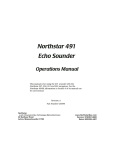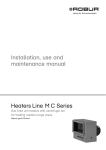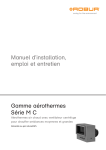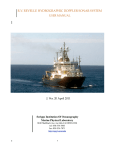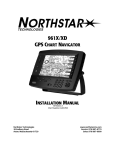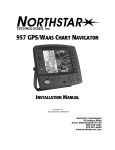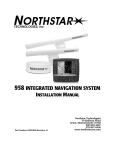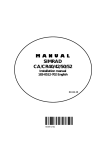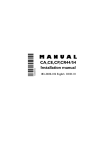Download Nortel Networks 2210 Cordless Telephone User Manual
Transcript
491 ECHO SOUNDER INSTALLATION MANUAL Rev A Part Number GM495 Northstar a unit of Brunswick New Technologies Marine Electronics 30 Sudbury Road Acton, Massachusetts 01720 www.NorthstarNav.com Service: 978/897-6600 Sales: 800/628-4487 Table of Contents SECTION ONE — Introduction - - - Welcome to the Northstar 491 Who should read this manual Scope of this manual - - - - Installation considerations - - - - - - - - - - - - - - - - - - 1 1 1 1 2 SECTION TWO — Installing the transducer Safety considerations - - - - - - Selecting a transducer - - - - - - Installation considerations - - - - Choosing a mounting location - - Installing the transducer - - - - - Maintaining the transducer - - - - - - - - - - - - - - - - - - 3 3 4 5 5 7 8 SECTION THREE — Installing the 491 Safety considerations - - - - - System components - - - - - - Choosing a mounting location - Mounting the 491 - - - - - - - Wiring the 491 - - - - - - - - Initial checkout - - - - - - - - Installation test checklist - - - - - - - - - - - - - - - - - 11 11 13 14 14 15 19 20 SECTION FOUR — Troubleshooting and servicing the 491 Common 491 installation problems - - - - - - - The status LED - - - - - - - - - - - - - - - - Getting technical support - - - - - - - - - - - Ordering replacement parts - - - - - - - - - - Servicing the 491 - - - - - - - - - - - - - - - Returning a 491 for service - - - - - - - - - - - - - - - - - 21 21 21 24 25 25 26 APPENDIX A — Technical specifications - - - - - - - - - - - - - - - - 27 Glossary - - - - - - - - - - - - - - - - - - - - - - - - - - - - - 29 Index - - - - - - - - - - - - - - - - - - - - - - - - - - - - - - - 31 SECTION ONE — Introduction Welcome to the Northstar 491 An echo sounder is a device that provides information about the water directly beneath a vessel. The Northstar echo sounder system consists of: • • • the Northstar 491 echo sounder sensor a Northstar navigation system such as the 962, 958 or 6000i a transducer The 491 can be used with either a single-element transducer or a dual-element transducer. The 491 automatically pings both transmitters at power-up to determine the number of transducer elements connected. If a single element is detected, the 491 operates in single-frequency or dual-frequency interleaved mode (as determined by the operator) at 600 Watts. If two elements are detected, the 491 uses both elements at 1000 Watts. Installation and setup procedures are different for the two basic types of Northstar navigators. The following terminology should be carefully followed: • • • the term 961/962 indicates instructions that apply to the Northstar 961 and the 962 navigators the term 957/958/6000i is used for these units the term navigator by itself identifies information that applies to all units Who should read this manual This manual is for marine technicians who are installing the Northstar 491 and connecting it to a Northstar navigator and a transducer. Scope of this manual In this manual, you’ll find information about the following: • • • mounting and wiring the 491 connecting the 491 to the Northstar navigator installing a transducer (an overview is provided, but for such details as wiring, see the documentation provided by the transducer’s manufacturer) 491 INSTALLATION MANUAL Revision A PAGE 1 SECTION ONE — Introduction • • • connecting the 491 to a transducer (see also the Transducer Connector Instructions—GM492) troubleshooting and testing the system technical specifications for the 491 For information about obtaining technical support and returning the 491 for factory service, “SECTION FOUR — Troubleshooting and servicing the 491” beginning on page 21. For details about operating the 491, see the Northstar 491 Echo Sounder Operations Manual (GM494) or Northstar 6000i’s Reference Manual, for that product. Installation considerations CAUTION! The following list of installation considerations isn’t a substitute for all the details in Section Three. To ensure that you meet all critical installation parameters, be sure to read that entire section and follow all of its recommendations. 1. Check the shipping carton for any damage, and immediately report any damage to the carrier. Save all packing material in case you have to return the 491 to the factory for repair or evaluation. 2. Unpack the carton, and check its contents. You should have received: • the Northstar 491 Echo Sounder • 10-foot (3-meter) data cable to connect the 491 to the navigator • 10-foot (3-meter) power cable for the 491 • 491 parts kit (containing transducer cable end connector, back- shell, heatshrink tubing, and the Transducer Connector Instructions—GM492) • Northstar 491 Echo Sounder Installation Manual (GM495) • Northstar 491 Echo Sounder Operations Manual (GM494) • owner registration card 3. Fill out the owner registration card and mail it to Northstar. 4. Review all of the installation requirements as outlined in Sections Two and Three. 5. Install the transducer, then terminate the cable (see ”Connecting the 491 to a transducer” starting on page 18). 6. Mount the 491. For instructions, see ”Mounting the 491” beginning on page 14. 7. Connect the 491 to ship’s power and to the navigator. Connection information begins on page 15. With the vessel in the water, turn on the system and verify proper operation. PAGE 2 491 INSTALLATION MANUAL Revision A SECTION TWO — Installing the transducer Safety considerations WARNING! Be sure to turn the power off before starting the installation. Further, it is highly recommended that you keep power off while you’re performing the installation. If power is left on or turned on during the installation, fire, electrical shock, or other serious injury may occur. Be sure to ground the equipment to prevent electrical shock and mutual interference. Be sure the transducer outputs are tied together before handling to avoid electrical charge build-up. WARNING! Be sure to use a 3-amp fuse. Using the incorrect fuse can result in fire or damage to the 491. CAUTION! Mounting the transducer requires drilling holes through the hull; make sure the installation does not cause the vessel to leak. A thru-hull installation should be performed by a professional installer. Do not attempt this unless you are fully qualified. Do not perform a thru-hull installation of the transducer when the vessel is actually in the water. Immediately after installing the transducer, be sure to check for leaks, and don’t leave the vessel in the water for more than three hours before checking it again. Northstar assumes no responsibility for improper installation of a transducer. NOTE: 491 INSTALLATION MANUAL Revision A Be sure that the transducer doesn’t interfere with any of the on-board systems. Check all other systems to ensure that their performance doesn’t degrade when the transducer is connected. PAGE 3 SECTION TWO — Installing the transducer Selecting a transducer Northstar recommends using an Airmar transducer with the Northstar 491 echo sounder. The Airmar B260, B744 and P66 can be obtained from Northstar as an installation kit with connectors installed. Table 1: Northstar-recommended transducers Manufacturer Housing Power Frequency Northstar P/N Airmar B260 1 kW 50/200 kHz TD1004 Airmar B744V/B44V (with 3-wire speed) 600 W 50/200 kHz TD1005 Airmar P66 600 W 50/200 kHz TD1006 A table of Airmar transducer elements is given below to assist in evaluating characteristics of other Airmar transducers. Table 2: Airmar transducer elements Transducer element Single or Dual element Used in Airmar P/N Acoustic material Beam Width (50 kHz) Beam Width (200 kHz) Rated Power 50/200A Single B744V B744VL P319 B117 SS555 Urethane 45° 12° 600W 50/200A Single P66 P79 P74 LPU 45° 11° 600W 50/200B Single B256 Urethane 23° 5° 1200W 50AE/200Riq Dual B45 B250-B B260 Urethane 19° 6° 1000W Dealers can also purchase quantities of transducers directly from Airmar Technology Corporation at: Airmar Technology Corporation 35 Meadowbrook Drive Milford, New Hampshire 03055-4613 Phone 603/673-9570 Fax 603/673-4624 (www.airmar.com) PAGE 4 491 INSTALLATION MANUAL Revision A SECTION TWO — Installing the transducer Installation considerations The following basic setup information isn’t a substitute for the installation instructions provided by the transducer’s manufacturer. To ensure that you meet all critical installation parameters, be sure to read and follow all of the requirements in their instructions. Northstar assumes no responsibility for improper installation. Choosing a mounting location CAUTION! Do not mount the transducer: behind strakes, fittings, or hull irregularities (mounting in those locations may increase turbulence, aeration, and cavitation) or near the keel near openings for water intake or discharge where it might be loosened by the vessel’s vibration less than four feet away from the Northstar 961/962 processor or other similar equipment to minimize interference The two most common problems with echo sounder installations stem from electrical noise and cavitation. Either of these situations can produce poor performance. Electrical noise occurs when the transducer cable is routed too closely to noise-producing electronics, such as alternators, AC generators, radars, etc. To avoid problems with noise, route the transducer cable by itself (not in a bundle) and away from other wires or cables and the engine. Cavitation can occur at high speeds. During cavitation, bubbles form between the transducer and the water. When this happens, the transducer can’t get its energy into the water properly and won’t be able to detect any echoes. To avoid cavitation, choose a mounting location with good water flow all around it at all speeds. Choose the mounting location to obtain the best possible performance from the transducer and the 491. Take into account the vessel’s maximum speed when selecting a mounting location, as turbulence can affect echo sounding capabilities. Before any drilling or cutting takes place, carefully choose a mounting location for the transducer that meets the following criteria (also see Figure 1 on page 7), depending on the type of vessel: • • • the transducer is more than four feet away from the Northstar navigator and other similar equipment, to prevent mutual electrical and magnetic interference the transducer and its cable are as far as possible from other electrical cables there is space above the transducer for the transducer’s stem, housing, and cable 491 INSTALLATION MANUAL Revision A PAGE 5 SECTION TWO — Installing the transducer • • • • • • • • the path for running the transducer’s cable is reasonably direct—keep in mind that the transducer cable is 33 feet long (10 meters). To prevent damage, coil any excess cable and secure it water turbulence and noise are minimal, decreasing the amount of bubbles passing over the transducer face the transducer isn’t behind hull irregularities or near eroding paint; both indicate areas subject to turbulence the transducer is as far as possible from the engine or propellers, and inboard of the lifting strakes the transducer always remains submerged and parallel to the water surface the transducer is easily accessible from inside the vessel for adjustments and maintenance the transducer’s ultrasonic beams aren’t obstructed by the keel, propeller shafts, or any other part of the vessel the hull thickness falls within the limits in Table 3 below (all dimensions are perpendicular to the waterline): Table 3: Hull thickness limits PAGE 6 Model Minimum Maximum AirMar B44V/B744V with fairing 6 mm (1/4 inch) 19 mm (3/4 inch) AirMar B44V/B744V without fairing 6 mm (1/4 inch) 65 mm (2 1/2 inches) AirMar B260 with fairing —— 45 mm (1 3/4 inches) AirMar B260 without fairing 19 mm (3/4 inch) 114 mm (4 1/2 inches) 491 INSTALLATION MANUAL Revision A SECTION TWO — Installing the transducer pressure waves 1/3 aft LWL (Load Waterline Length) 150-300mm (6-12") displacement hull outboard and I/O planning hulls inboard step-hull fin keel sailboat full keel sailboat Best location for the transducer FIGURE 1: Recommended installation locations for a transducer Installing the transducer A flat-bottom hull provides the best environment for mounting the transducer: It provides a horizontal surface and a constant water flow over the transducer, with little turbulence (see Figure 2 for the recommended transducer incline angle). If the vessel has a deadrise angle greater than 5 degrees, mount the transducer on a fairing block to create a horizontal surface and keep the transducer perpendicular to the waterline (see Figure 3). You must order the fairing block, if needed, from the transducer’s manufacturer. 491 INSTALLATION MANUAL Revision A PAGE 7 SECTION TWO — Installing the transducer 3˚ incline angle 1/3 aft LWL (Load Waterline Length) FIGURE 2: Recommended transducer incline angle backing block slope of hull deadrise angle hull parallel to waterline fairing fairing thickness at narrowest point 6–12mm (1/4–1/2") multisensor Deadrise angle and fairing thickness (B44V shown) FIGURE 3: Typical finished thru-hull installation with a fairing block (Airmar B744V) Maintaining the transducer Using anti-fouling paint PAGE 8 Do not expose the transducer’s face or plastic housing to gasoline or strong solvents, such as acetone. These solvents can penetrate and degrade many plastics and reduce their strength. The transducer should be coated with water-based anti-fouling paint to prevent aquatic growth. 491 INSTALLATION MANUAL Revision A SECTION TWO — Installing the transducer housing paddle wheel insert Paint exposed housing and bore up 30mm (1-1/4") detail lower O-ring Paint outside wall below the lower O-ring including exposed end, paddle wheel cavity and paddle wheel Anti-fouling paint (B744V shown) FIGURE 4: Anti-fouling paint areas (for Airmar B744V) CAUTION! Cleaning a transducer Use special transducer paint. Other paints may contain copper, which is conductive and can burn out the transducer within minutes! To clean the transducer of heavy debris or foul sea growth, use a stiff brush or putty knife, but don’t scratch the surfaces. Check the transducer every few weeks, maximum. Use sanding sparingly, as repeated sanding may affect the transducer’s performance at high speeds. For lighter cleaning, the surface may be wet-sanded with #220 or finer wet/dry sandpaper. 491 INSTALLATION MANUAL Revision A PAGE 9 SECTION TWO — Installing the transducer PAGE 10 491 INSTALLATION MANUAL Revision A SECTION THREE — Installing the 491 Safety considerations WARNING! Be sure to turn the power off before starting the installation. Further, it is highly recommended that you keep the power off while you’re performing the installation. If power is left on or turned on during the installation, then fire, electrical shock, or other serious injury may occur. Be sure to ground the equipment to prevent electrical shock and mutual interference. Be sure that the voltage of the power supply is between 10 and 36 volts DC. Connecting to the wrong power supply can result in fire or damage to equipment. Be sure to use a 3-amp fuse. Using the incorrect fuse can result in fire or damage to the 491. CAUTION! Keep the following safe compass distances from the 491: 1.0 m standard, 0.8 m steering. CAUTION! Be sure that the 491 doesn’t interfere with any of the on-board systems. Check all other systems to ensure that their performance doesn’t degrade when the 491 is turned on. If the vessel is out of the water when the echo sounder is turned on, the transducer may be damaged. CAUTION! Do not open the 491. There are no serviceable parts inside. Unauthorized tampering with the unit will automatically void the warranty. CAUTION! Do not mount the 491 in the bilge. It is not designed to resist heavy exposure to water and chemicals. 491 INSTALLATION MANUAL Revision A PAGE 11 SECTION THREE — Installing the 491 PAGE 12 491 INSTALLATION MANUAL Revision A SECTION THREE — Installing the 491 System components Figure 5 on page 13 shows a configured 961/962 echo sounder system, and Figure 6 on page 13 shows a configured 957/958/6000i echo sounder system. GPS Antenna Northstar 961/962 display 10-foot data cable (Northstar-supplied) Northstar 961/962 Processor Shipʼs Power Northstar 491 Echosounder 33-foot cable (Part of transducer) 10-foot power cable (Northstar-supplied) Transducer Figure 5: Echo sounder system components with the Northstar 961/962 GPS Antenna 10-foot data cable (Northstar-supplied) Northstar 957/958/6000i Navigator Shipʼs Power 10-foot power cable (Northstar-supplied) Northstar 491 Echosounder 33-foot cable (Part of transducer) Transducer Figure 6: Echo sounder system components with the Northstar 957/958/6000i 491 INSTALLATION MANUAL Revision A PAGE 13 SECTION THREE — Installing the 491 Choosing a mounting location Before any drilling or cutting takes place, carefully choose a mounting location for the 491 module that meets the following criteria: • • • • where the transducer cable is kept securely away from other wires where the path for running the required electrical cabling is reasonably direct; keep in mind the different cable lengths where the 491 won’t be exposed to water where the status indicator (on the front of the 491) can be observed for system testing and troubleshooting. NEVER MOUNT THE 491 MODULE IN THE BILGE! Mounting the 491 Figure 7 shows the mounting dimensions for the 491. The 491 may be mounted either horizontally or vertically. The mounting template supplied with the unit may be helpful in planning the installation and locating the mounting holes. The keyhole slots make installation in hard-to-reach areas easier, but be sure to tighten all mounting screws securely. Leave room for installing and removing cables. 8.78 5.80 0.190 dia. 0.360 dia. 2.35 2.90 2.90 491 Echo Sounder BNT Marine Electronics 30 Sudbury Road Acton MA 01720 800-628-4487 www.NorthstarNav.com 8–36 VDC 8 Watts Allow space for cabling from connectors. STATUS POWER 0.190 dia. #1 Speed Sig #4 Thermistor #5 Depth Lo + #8 Depth Hi + #10 Depth Hi – DATA 6.24 7.22 #2 Speed +V #3 Speed Gnd #7 Thermistor #6 Depth Lo – #9 Depth Shields TRANSDUCER 0.75 Dimensions in inches FIGURE 7: 491 mounting dimensions and connector locations PAGE 14 491 INSTALLATION MANUAL Revision A SECTION THREE — Installing the 491 Wiring the 491 CAUTION! Make sure that fuse or circuit-breaker protection is provided at the power source. The majority of installation problems are caused by shortcuts taken with system cables. When installing the 491, be sure that you: • • • • • • assemble connectors carefully don’t make sharp bends in the cables leave service and drip loops, so that moisture won’t run down the cables and into the 491 or the navigator tie-wrap all cables to keep them secure if cables are shortened, lengthened (not recommended), or re-terminated, seal all wiring splices prevent interference from the transducer cable Electrical power requirements The 491 is a negative-ground system that is reverse-polarity and overvoltage protected. The unit requires 8 to 36 VDC power at 8 Watts. Connecting the 491 to ship’s power The connection between ship’s power and the 491 requires the 10-foot (3-meter) power cable supplied with the 491. The wires in the power cable must be connected as follows (black and white can be connected together at the power source): • • • Red → Positive (+) (fused lead) Black → Negative (–) Green → Ground (earth) NOTE: Connecting the 491 to the 961/962 The 491 should be grounded to the vessel to eliminate interference. Secure the green wire to the vessel’s nearest grounding point. Without an earth grounding, performance may be degraded. The connection between the 961/962 and the 491 uses the 10-foot (3-meter) data cable supplied with the 491. The cable connects to the P1 slot on the back of the navigator. The cable is shipped with a round 6-pin connector that attaches to other Northstar navigators. To install the 491 with a 961 or 962, you must cut off and discard the 6-pin connector, and wire the cable as shown below. Be sure you don’t cut off the 8-pin connector that plugs into the 491! Figure 8 below illustrates the wiring at the 961/962 end of the cable. Table 4 describes the pin’s functions. 491 INSTALLATION MANUAL Revision A PAGE 15 SECTION THREE — Installing the 491 18 961/962 P1 Connector Plug (Wiring Side View) 17 16 Green 15 14 13 Orange 12 White Violet 11 Brown 10 9 8 Data Cable Black Blue Red (not connected) 7 6 5 4 3 2 1 FIGURE 8: Interface cable connection from 961/962 to 491 Table 4: Cable connection between the 961/962 and 491 961/962 pin number 961/962 P1 signal name Cable wire color 9 Port 3 In (A) Blue 10 Port 3 In (B) Black 11 Ground Brown 12* Port 3 Out (A) Violet 12* Port 3 Out (A) White 13 Port 3 Out (B) Orange 16 Ground Green ** Not connected Red * Connector P1, pin 12 on the 961/962 requires two connections from the cable. **The red wire is not connected on the 961/962 end, and should be insulated and capped. PAGE 16 491 INSTALLATION MANUAL Revision A SECTION THREE — Installing the 491 The connection between the 957/958/6000i and the 491 requires the 10-foot (3-meter) data cable supplied with the 491. The cable connects to the AUX port on the back of the navigator. Connecting the 491 to the 957/958/ 6000i The cable is shipped with the connector installed — the following information is provided for cases where it is necessary to remove and reinstall the connector. Figure 9 below illustrates the wiring for the navigator end of the cable. Table 5 describes the pin’s functions. Brown (pin 1) Green (pin 1) White (pin 2) Blue (pin 6) Orange (pin 5) Violet (pin 4) Black (pin 3) Figure 9: Interface cable connection from 957/958/6000i to 491 Table 5: Cable connection between the 957/958/6000i and 491 navigator pin number AUX port signal name Cable wire color 1* Shield/Gnd Brown 1* Remote On Gnd Green 2 Remote On input White 3 NMEA AUX In (B) Black 4 NMEA AUX Out (A) Violet 5 NMEA AUX Out (B) Orange 6 NMEA AUX In (A) Blue * Pin 1 on the 957 AUX port requires two connections from the cable. The red wire is not connected on the navigator end, and should be insulated and capped. 491 INSTALLATION MANUAL Revision A PAGE 17 SECTION THREE — Installing the 491 Connecting the 491 to a transducer Transducers purchased from Northstar (see page 4) are shipped with a connector installed. The following information is supplied for transducers purchased elsewhere and for cases where it is necessary to remove and reinstall the connector. CAUTION! High voltage is present on the transducer wires! Figure 10 and Figure 11 below show how to install the connector on the cable. 1. Slide the heat shrink tubing onto the transducer cable. 2. Slide the connector backshell onto the transducer cable. 3. Prepare each wire for insertion into its solder cup by stripping it as shown below and tinning it. 4. Carefully solder each wire to the appropriate cup as specified in the table. 5. Slide the backshell down the wire and screw it onto the connector body. It should be hand-tight. 6. Using the supplied screws, screw the strain relief onto the backshell. 7. Slide the heat shrink tubing onto the connector. Be sure to leave room for the locking collar to retract. 8. Heat the shrink tubing until it shrinks around the connector providing a watertight seal. Table 6: 491-to-transducer connector pin wiring PAGE 18 Signal name Pin no. Wire color (Airmar B260 ONLY) Wire color (Airmar B44/B744V and P66 ONLY) Speed signal 1 N/A Green Speed +V 2 N/A Red Speed ground 3 N/A Bare Thermistor (temperature) 4 Brown Brown Depth 50 kHz + (unused on single-frequency transducer) 5 Yellow N/A Depth 50 kHz – (unused on single-frequency transducer) 6 Blk/Wht N/A Thermistor (temperature) 7 White White Depth 200 kHz + 8 Blue Blue Depth shields 9 Shields Shields Depth 200 kHz – 10 Black Black 491 INSTALLATION MANUAL Revision A SECTION THREE — Installing the 491 1/2” Max. #1 Speed Signal #4 Thermistor #5 Depth 50 kHz + #8 Depth 200 kHz + #10 Depth 200 kHz – 2 1 3 5 4 6 8 7 9 10 #2 Speed +V #3 Speed Gnd #7 Thermistor #6 Depth 50 kHz – #9 Depth Shields 3/16” Wire stripping detail FIGURE 10: Wiring of B260 transducer cable (solder-cup side of connector shown) 1/2” Max. #1 Speed Signal #4 Thermistor #5 Depth 50 kHz + #8 Depth 200 kHz + #10 Depth 200 kHz – 2 1 3 5 4 6 8 7 9 10 #2 Speed +V #3 Speed Gnd #7 Thermistor #6 Depth 50 kHz – #9 Depth Shields 3/16” Wire stripping detail FIGURE 11: Wiring of B44/B744 and P66 transducer cable (solder-cup side of connector shown) Plug the transducer cable into the TRANSDUCER connector of the 491. If your transducer doesn’t support speed, you can connect a separate speed sensor, such as the Airmar ST650, to pins 1, 2 and 3, as shown in the table. Initial checkout Turning the 491 on This section assumes that the 491, Northstar navigator, and transducer are now all properly connected. Turning on the navigator automatically turns on the 491 (be sure your vessel is in the water). To turn the navigator on, briefly press its PWR key. For the 961/962 To use the 491 echo sounder, the 961/962 must be running software version 3.0 or higher. If not, contact the factory to obtain the upgrade CD. To install the upgrade, follow the steps on the back of the jewel box. You must set the 961/962’s Port 3 to “490”: 1. 2. 3. 4. Press STAR to display the SERVICE MENU screen. Press PORT SETUP. Press PORT 3. Set the FORMAT option to 490. The STATUS indicator light on the 491 glows steady green when the 491’s power is on. 491 INSTALLATION MANUAL Revision A PAGE 19 SECTION THREE — Installing the 491 For the 957/958/6000i You must set the navigator’s AUX port to “Sounder”: 1. Press the STAR key to display the OPTIONS/SERVICE INFO screen, then press the PORT SETUP OPTIONS key. 2. Set the AUX PORT option to Sounder, then press the ENTER key. The STATUS indicator light on the 491 glows steady green when the 491’s power is on and it is communicating with the navigator. Setting up the echo sounder You’ll need to set the echo sounder display options on the navigator’s ECHO SOUNDER SETUP screen. Press the STAR key to display this screen and set these options. For details, see the Northstar 491 Echo Sounder Operations Manual (GM494). Turning the 491 off To turn off the 491, turn off the navigator by pressing and holding PWR until the screen goes dark. The 491 will turn off automatically. Installation test checklist CAUTION! If the vessel is out of the water when the echo sounder is turned on, the transducer may be damaged. Perform all tests on the with the vessel in the water. 1. Make sure the vessel is in the water. 2. To test the system after installation, turn on the navigator and confirm that power is on with no errors. If echo sounder data isn’t moving across the ECHO screen from right to left, see ”Common 491 installation problems” beginning on page 21. PAGE 20 491 INSTALLATION MANUAL Revision A SECTION FOUR — Troubleshooting and servicing the 491 Common 491 installation problems Typical problems you may encounter either during or after the 491 installation process are outlined in Figure 12 on page 22 and Figure 13 on page 23. The status LED The two-color LED located behind the 491’s front-panel STATUS window displays the unit’s current condition. In the 961/962, the diagnostics screen may also help pinpoint a problem. The LED presents the following information: • • • solid green: System has power, self-test passed, and communicating with navigator. Flashing green: 491 is not communicating with the navigator. Red: Self-test failed 491 INSTALLATION MANUAL Revision A PAGE 21 SECTION FOUR — Troubleshooting and servicing the No echoes displayed when STAR key is pressed. Is the Advance Speed set to zero? Change the Advance Speed setting. YES NO Contact Northstar Service to upgrade to the latest version of 961/962 software. NO Is the 961/962 software Version 3.0 or greater? YES Configure NMEA Port 3 for the 491. See the “Initial checkout” section of this manual. NO Has NMEA Port 3 been configured for the 491? YES 491 is communicating with the navigator 1. Check fuses and circuit breakers 2. Check power to 491 with a voltmeter. 3. Verify that the data cable between the 961/962 and the 491 is properly wired and connected. OFF Check the 491's STAT indicator FLASHING GREEN The 491 and the 961/962 aren't communicating properly. Check the wiring of the data cable between the 961/962 and the 491. STEADY GREEN 1. Check transducer connector for the proper wiring. 2. If wiring is correct,check transducer impedance with an ohmmeter. 3. If the transducer is open or shorted, replace it RED There's a hardware problem with the 491. Figure 12: 961/962 echo sounder system troubleshooting PAGE 22 491 INSTALLATION MANUAL Revision A SECTION FOUR — Troubleshooting and servicing the No echoes displayed on sounder screen. Is the Advance Speed set to zero? YES Change the Advance Speed setting. NO Configure the navigatorʼs Aux Port for the 491. See the “Initial checkout” section of this manual. NO Has the navigatorʼs Aux Port been configured for the 491? YES 1. Check fuses and circuit breakers. 2. Check power to 491 with a voltmeter. 3. Verify that the data cable between the navigator and the 491 is properly wired and connected. 491 is communicating with the navigator. OFF Check the 491's STAT indicator FLASHING GREEN The 491 and the navigator aren't communicating properly. Check the wiring of the data cable between the navigator and the 491. RED STEADY GREEN 1. Check transducer connector for the proper wiring. 2. If wiring is correct,check transducer impedance with an ohmmeter. 3. If the transducer is open or shorted, replace it There's a hardware problem with the 491. Figure 13: 957/958/6000i echo sounder system troubleshooting 491 INSTALLATION MANUAL Revision A PAGE 23 SECTION FOUR — Troubleshooting and servicing the Getting technical support You can E-mail the Service Department directly from Northstar’s website (www.northstarnav.com). Here, you also can access additional technical information under either the Manuals link (you can download manuals in PDF form) or Support link. After you’ve followed the instructions in this manual, if you need additional technical or operations support for the 491, or if you have any other service-related questions, you can contact either your dealer or the Northstar factory. You can reach the Service Department by E-mail, fax, U.S. mail, or phone as described in Table 7 below. NOTE: Please have the following items available when you contact Northstar. • • the 491’s serial number, located on the top of the unit the transducer manufacturer’s name and the transducer’s model and part number Please be as complete and accurate as possible when describing the problem so that a service technician can research the problem and provide the quickest response. The Northstar Service Department is available between 9:00 AM and 5:00 PM Eastern Time, Monday through Friday, excluding major holidays. If you have questions about purchasing parts or finding an authorized Northstar dealer, or if you want basic product information and brochures, contact the Northstar Sales Department as described in the table below. Table 7: Contacting Northstar Email: Service: [email protected] Sales: [email protected] Fax: Service: 978/897-1595 Sales: 978/897-7241 Telephone: Main number: 978/897-6600 or 800/ 628-4487 Sales: 978/897-0770 Service: 978/897-6600 U.S. mail: Northstar 30 Sudbury Road Acton, MA 01720 Website: www.northstarnav.com (you can send E-mail to Northstar directly from this site) PAGE 24 491 INSTALLATION MANUAL Revision A SECTION FOUR — Troubleshooting and servicing the Hearing from you Your feedback is important and helps Northstar ensure that this manual is a valuable resource for all marine technicians. Send your questions, comments, or suggestions about this manual to: [email protected] Ordering replacement parts To order spare parts or replacement/missing parts, call the Sales Department at 978/897-0770. Servicing the 491 Repair of the 491 is performed only at the factory. Service includes a complete hardware and software check-out. NOTE: Field repairs are not authorized and will void the warranty! For transducer service, including parts and repairs, please contact the transducer manufacturer. The 491 and any accessories returned for warranty repair that are determined to be without fault are subject to a handling charge. 491 INSTALLATION MANUAL Revision A PAGE 25 SECTION FOUR — Troubleshooting and servicing the Returning a 491 for service If you have overnight or second-day shipping requirements, before shipping the 491, please call Northstar for turnaround time, freight charges, and payment arrangements. Before returning the 491 to the factory, to prevent delays it is critical that you first obtain a Return Materials Authorization (RMA) number from the Northstar Service Department. If the 491 was purchased through a dealer, call the dealer with the 491 serial number so they can help you get an RMA number. The 491’s serial number can be found on the label at the top of the 491. The 491 should be shipped only in a properly designed carton with packing material. Shipments to the Northstar factory should be made to the following address: Northstar Service Department 30 Sudbury Road Acton, MA 01720 USA NOTE: Return the transducer to its manufacturer, not to Northstar. Shipments without a proper RMA number will not be accepted! PAGE 26 491 INSTALLATION MANUAL Revision A APPENDIX A — Technical specifications Table 8: 491 technical specifications Performance characteristics Frequencies 50 and 200 kHz Output power 1000 watts with dual-element transducers 600 watts with single-element transducers Pulse lengths 0.1 to 2 ms Pulse repetition rate 30 to 600 pulses/min Alarms Fish, bottom, and temperature Update rate 10 Hz maximum (depends on water depth) (up to 20Hz when used with the Northstar 6000i) Zoom modes Marker, bottom lock, bottom lock/center, bottom Auto modes Fishing or cruising Navigation data Shown on bottom of screen Display modes Single/dual frequency, split-screen, four zoom modes, A-Scope Physical characteristics Dimensions 8.78 x 7.22 x 2.35 inches (including backplate) Weight 2 pounds Environmental characteristics Temperature -25˚C to +60˚C operating temperature -55˚C to +90˚C storage temperature Standards Waterproof, sealed design meets the following: EN60529 IP65; EN60945 emissions; CE Electrical characteristics 8 to 36 VDC, 8 watts, reverse polarity and overvoltage protection Transducer outputs protected against open circuit/short circuit 491 INSTALLATION MANUAL Revision A PAGE 27 APPENDIX A — Technical specifications Table 8: 491 technical specifications (Continued) Manual controls PAGE 28 Gain 0 to 75 dB Clutter 0 to 9 Signal level 0 to 5 Noise limiter ON/OFF White level Background color Range up to 3500 feet (1000 meters) Advance speed 1/8 to 2/1 Depth units Feet, meters, fathoms Installation calibrations Speed, temperature, gain, transducer depth/ offset 491 INSTALLATION MANUAL Revision A Glossary cavitation The formation of bubbles, which may negatively impact a transducer’s readings by reducing its ability to put energy into the water. deadrise The rise of the bottom of a vessel above a horizontal line at the center of the vessel; that is, the slope of the hull away from the horizontal. echo sounder An instrument that uses sound waves to measure the depth of a body of water or an object (such as a school of fish) below the water’s surface. fairing block transducer water column A block used to create a horizontal surface for mounting a thru-hull transducer when the vessel’s deadrise is more than 5 degrees. The device mounted through the hull to send and receive ultrasonic beams that determine seabed conditions and locate fish. Essentially, a transducer is an energy converter, which changes electricity to sound (send) and sound to electricity (receive). An imaginary column through the water created by the path of a single transducer ping and its echoes. 491 INSTALLATION MANUAL Revision A PAGE 29 Glossary PAGE 30 491 INSTALLATION MANUAL Revision A Index A Airmar Technology Corporation 4 C Cable 491 and 961/962 14 491 and ship’s power 14 491 to 957/958/6000i 16 Cautions installation 2, 3, 11 interference with 491 11 tampering with the 491 11 transducer 3, 5, 19 troubleshooting the 491 19 wiring the 491 14, 17 E Echo sounder components of system 1, 12 definition of 29 installation. See Installation, 491 serial number 26 setup options 19 specifications 27 STAT indicator light 18 turning off 19 turning on 18 wiring 14 Electrical power, requirements 14 F Fairing block, definition of 29 I Installation 491 cautions 2, 11, 14, 17, 19 connecting to 957/958/6000i 16 connecting to 961/962 14 connecting to ship’s power 14 electrical power requirements 14 general considerations 2 mounting dimensions 13 mounting location 13 491 INSTALLATION MANUAL Revision A PAGE 31 Index overview 11 safety considerations 11 troubleshooting 21 wiring 14 transducer cautions 3, 5, 19 cavitation 5 hull thickness limits 6 noise problems 5 preferred mounting location 5 recommended incline angle 8 thru-hull installation with a fairing block 8 M Maintenance, transducer 8 N Northstar feedback on manuals 25 website. See Website addresses Northstar 491 Echo Sounder. See Echo sounder Northstar 957/958 GPS/WAAS Chart Navigator 18 Northstar 957/958/6000i GPS/WAAS Chart Navigator 1 Northstar 961/962 GPS Chart Navigator 1 P Parts, ordering. See Technical support S Safety considerations 491 11 transducer 3 Software upgrades, obtaining 18 Specifications 27 STAT (status) indicator light 18 T Technical support contacting Northstar 24 ordering parts 25 repairing the 491 25 repairing the transducer 25 Transducer definition of 29 installation. See Installation, transducer maintenance. See Maintenance, transducer mounting. See Installation, transducer recommended 4 service, parts and repair 25 Troubleshooting diagnostics screen 21 flow chart 23 installation checklist 19 installation problems 21 PAGE 32 491 INSTALLATION MANUAL Revision A Index U Upgrades, obtaining software 18 W Water column, definition of 29 Website addresses Airmar Technology Corporation 4 Northstar 24 Northstar Technologies 24 491 INSTALLATION MANUAL Revision A PAGE 33 Index PAGE 34 491 INSTALLATION MANUAL Revision A






































